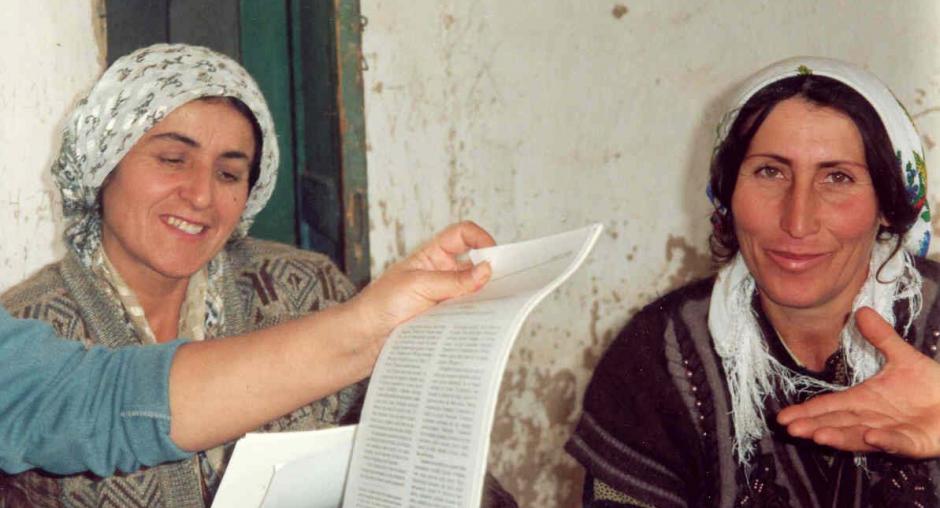Newsroom
Draft Tajik law on gender equality discussed at OSCE roundtable
DUSHANBE 10 March 2003

The OSCE Centre in Dushanbe organized training sessions for women's rights, like this one in Shartuz, southern Tajikistan, February 2002. (Dinis Onofre) Photo details
DUSHANBE, 10 March 2003 - Participants in an OSCE roundtable in Dushanbe welcomed the initiative of the Tajik Government to draft a law on gender equality.
"This roundtable proves that the Government is seriously directing its attention to improving legal provisions," said Ambassador Marc Gilbert, the Head of the OSCE Centre in Dushanbe, at the opening of the roundtable.
Organized by the OSCE Centre in co-operation with the Tajik Parliament, the event last Friday was financially supported by the United Nations Population Fund and the Government of Switzerland. The co-operation aims at assisting the government of Tajikistan in the drafting process of this human rights provision.
Ms. Rano Samieva, member of the Lower Chamber of the Tajik Parliament and initiator of the draft law, informed the participants about the drafting process and key issues of the law.
"It was not easy to convince even some of our parliamentarians that there is a real need for adopting such a law in Tajikistan. It is true that our President issued decrees for improving gender equality, but it is also necessary to put them into a legal frame," she said.
"The Committee on Women's Affairs under the Presidential Office is also in the process of drafting an alternative law on gender equality," said Ms. Latofat Nasriddinova, the Chairwoman of the Committee. "We all are interested in improving the situation for women in Tajikistan and therefore need to adopt a law that will be effective for centuries."
Ms. Shanthi Dairiam, Director of the International Women's Rights Action Watch - Asia Pacific, reviewed the current draft law and provided comments on the law's content and goals for discussion. Recommendations in key areas included the necessity to broaden the definition of discrimination in order to include indirect discrimination; the suggestion to embrace a mechanism for remedying individual cases, as well as a proactive obligation to reduce a discriminatory environment; the recommendation to broaden the scope of liability and to vest key institutions (such as the human rights commission and the women's committee) with broader powers for monitoring and implementing the law.
Non-governmental organizations were particularly sensitive about the proposed implementation mechanism and about the inadequacy of specific temporary provisions such as a quota for political representation of women. It was pointed out that the Tajik Government, being a state party to the Convention on the Elimination of All Forms of Discrimination Against Women (CEDAW), has a responsibility to eliminate de-facto discrimination by enacting temporary special measures.
"This roundtable proves that the Government is seriously directing its attention to improving legal provisions," said Ambassador Marc Gilbert, the Head of the OSCE Centre in Dushanbe, at the opening of the roundtable.
Organized by the OSCE Centre in co-operation with the Tajik Parliament, the event last Friday was financially supported by the United Nations Population Fund and the Government of Switzerland. The co-operation aims at assisting the government of Tajikistan in the drafting process of this human rights provision.
Ms. Rano Samieva, member of the Lower Chamber of the Tajik Parliament and initiator of the draft law, informed the participants about the drafting process and key issues of the law.
"It was not easy to convince even some of our parliamentarians that there is a real need for adopting such a law in Tajikistan. It is true that our President issued decrees for improving gender equality, but it is also necessary to put them into a legal frame," she said.
"The Committee on Women's Affairs under the Presidential Office is also in the process of drafting an alternative law on gender equality," said Ms. Latofat Nasriddinova, the Chairwoman of the Committee. "We all are interested in improving the situation for women in Tajikistan and therefore need to adopt a law that will be effective for centuries."
Ms. Shanthi Dairiam, Director of the International Women's Rights Action Watch - Asia Pacific, reviewed the current draft law and provided comments on the law's content and goals for discussion. Recommendations in key areas included the necessity to broaden the definition of discrimination in order to include indirect discrimination; the suggestion to embrace a mechanism for remedying individual cases, as well as a proactive obligation to reduce a discriminatory environment; the recommendation to broaden the scope of liability and to vest key institutions (such as the human rights commission and the women's committee) with broader powers for monitoring and implementing the law.
Non-governmental organizations were particularly sensitive about the proposed implementation mechanism and about the inadequacy of specific temporary provisions such as a quota for political representation of women. It was pointed out that the Tajik Government, being a state party to the Convention on the Elimination of All Forms of Discrimination Against Women (CEDAW), has a responsibility to eliminate de-facto discrimination by enacting temporary special measures.
